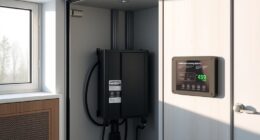Maintaining a hybrid battery involves tackling unique challenges like managing thermal issues to prevent overheating, which can reduce its lifespan. Proper cooling systems and regular inspections ensure your battery stays within safe temperature ranges. Recycling responsibly is also essential for environmental health and resource conservation. Using a reliable Battery Management System (BMS) helps monitor performance and detect problems early. If you want to discover more tips to keep your hybrid battery in top shape, keep exploring effective maintenance solutions.
Key Takeaways
- Hybrid batteries require regular thermal management to prevent overheating and degradation.
- Monitoring the Battery Management System (BMS) helps detect early signs of imbalance or wear.
- Routine inspections of cooling systems and coolant levels ensure optimal temperature control.
- Proper recycling and disposal prevent environmental hazards and recover valuable materials.
- Addressing unique heat and usage patterns extends hybrid battery lifespan and performance.

Maintaining your hybrid battery is essential to ensuring your vehicle runs smoothly and efficiently. These batteries are complex components that require careful attention to keep them in top condition. One of the key aspects of hybrid battery maintenance involves understanding the importance of battery recycling. When your hybrid battery reaches the end of its lifespan, proper recycling is crucial to prevent environmental harm and recover valuable materials like lithium, cobalt, and nickel. Recycling not only reduces waste but also supports sustainable practices, helping to conserve natural resources for future use. Many manufacturers and certified recycling centers can handle this process, so it’s important to follow local regulations and dispose of your old battery responsibly. By doing so, you contribute to environmental protection and guarantee that hazardous materials don’t contaminate soil or water sources.
Another critical factor in hybrid battery health is thermal management. Hybrid batteries generate heat during operation, and excessive heat can accelerate degradation, leading to reduced performance and shorter lifespan. Proper thermal management involves maintaining the battery within ideal temperature ranges, often through cooling systems integrated into the vehicle. If you notice signs like sudden loss of power, overheating warning lights, or reduced fuel efficiency, it could indicate thermal issues. Regularly inspecting cooling fans, coolant levels, and vents can help prevent overheating. Some vehicles have active cooling systems that use liquid or air to dissipate heat, and ensuring these systems are functioning correctly is essential. Keeping the battery cool helps preserve its capacity and prolongs its overall lifespan, saving you money on replacements and repairs. Additionally, battery management systems play a vital role in monitoring and maintaining optimal operating conditions to prevent thermal damage.
In addition to recycling and thermal management, routine maintenance checks can catch potential issues early. Monitoring your battery’s state of health and keeping an eye on dashboard warning lights are simple yet effective steps. If your vehicle’s battery temperature sensor detects abnormal readings, addressing the problem promptly can prevent further damage. Many hybrid owners overlook the significance of maintaining proper insulation and ensuring that the battery compartment remains clean and free from debris, which can affect cooling efficiency. Regular professional inspections can identify early signs of wear or imbalance, allowing for timely intervention.
Frequently Asked Questions
How Long Do Hybrid Batteries Typically Last?
Hybrid batteries typically last between 8 to 15 years, depending on usage and maintenance. To extend their battery lifespan, you should regularly inspect and properly recycle old batteries, ensuring environmental safety. Proper maintenance helps prevent premature failure, saving you money and reducing waste. When it’s time for replacement, consider battery recycling programs to responsibly dispose of the old battery, ensuring environmental protection and supporting sustainability efforts.
Can Hybrid Batteries Be Recycled?
Yes, hybrid batteries can be recycled, and doing so is a game-changer for the environment! Battery recycling helps recover valuable materials, reducing the need for new resources and profoundly lowering the environmental impact. When you recycle your hybrid battery, you’re preventing hazardous waste and contributing to a healthier planet. Don’t underestimate the power of proper disposal—recycling your hybrid battery makes a huge difference for the environment and future generations.
What Are Signs of Hybrid Battery Failure?
You’ll notice signs of hybrid battery failure when your vehicle’s performance drops, the engine runs more often, or you see warning lights on the dashboard. Battery degradation causes reduced power, while electrical diagnostics can reveal underlying issues. Pay attention to unexpected stalls, decreased fuel efficiency, or difficulty in charging. Addressing these early signs helps prevent further damage and keeps your hybrid running smoothly.
Is There a Warranty on Hybrid Batteries?
Warranty wonders work wonders for hybrid batteries. You’ll find warranty coverage often varies, but many manufacturers offer extended warranties, sometimes up to 8 years or 100,000 miles. If your battery begins to falter, warranty coverage can cushion the cost of battery replacement, easing expenses and encouraging confidence. Be sure to check your specific warranty details, as coverage and conditions differ, giving you peace of mind and protecting your hybrid’s health.
How Does Climate Affect Hybrid Battery Longevity?
Climate impact and temperature effects considerably influence your hybrid battery’s longevity. Excessive heat accelerates battery degradation, reducing its lifespan, while cold climates can temporarily diminish performance but typically don’t cause lasting damage. To protect your battery, avoid exposing your vehicle to extreme temperatures for extended periods, use climate control features, and perform regular maintenance. Understanding these climate effects helps you maximize your hybrid battery’s lifespan and maintain ideal performance.
Conclusion
Maintaining your hybrid battery is crucial for ideal performance and longevity. Despite the unique challenges, staying proactive can considerably extend its life. Did you know that proper maintenance can increase hybrid battery lifespan by up to 30%? By following recommended procedures and addressing issues promptly, you ensure your vehicle runs smoothly and efficiently. Keep an eye on battery health, and you’ll enjoy reliable performance and savings for years to come.










